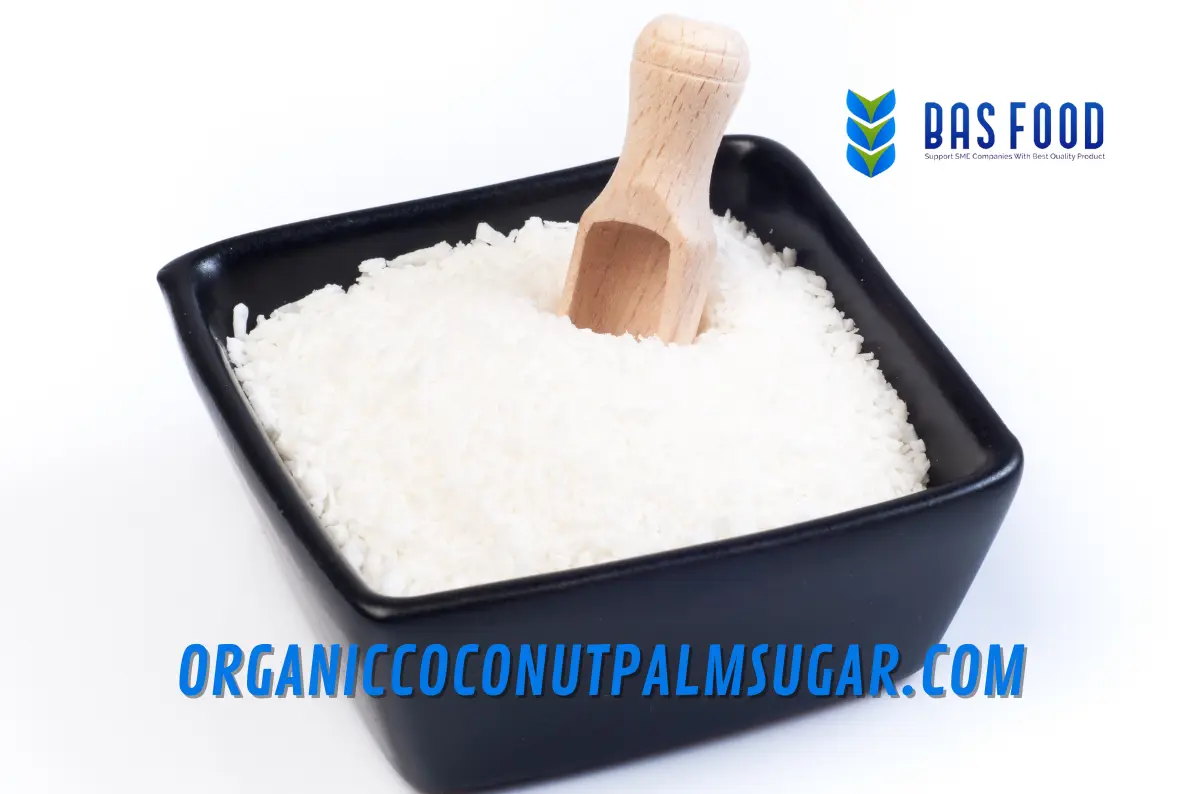In recent years, organic desiccated coconut has become one of the most sought-after products in the global health food and baking industries. This dried form of pure coconut meat isn’t just a tasty ingredient—it represents a commitment to sustainability, traceability, and international food safety standards.
As consumers become more conscious about where their food comes from, the demand for products with trusted certifications such as USDA Organic, EU Organic Certification, Halal, and ISO Food Safety has surged. For coconut producers, meeting these standards isn’t just about compliance. It’s about proving quality and integrity in every step of production.
In this article, we’ll explore what makes organic desiccated coconut stand out, how certification processes ensure safety and purity. We will also explain why Indonesia, home to companies like CV Bonafide Anugerah Sentosa, is becoming a world leader in sustainable coconut production and export.

What Is Organic Desiccated Coconut?
Organic desiccated coconut is the finely grated and dried white flesh of mature coconuts. It is produced without synthetic fertilizers, pesticides, or genetically modified organisms (GMOs). The process begins with organically grown coconuts that are harvested, peeled, washed, sterilized, and gently dried to retain natural nutrients and flavor.
Unlike conventional coconut products, organic desiccated coconut ensures that no chemicals or artificial additives come into contact with the fruit during cultivation or processing. The goal is simple: to preserve the coconut’s natural purity and maintain its organic integrity from tree to table.
Organic desiccated coconut comes in several forms—fine, medium, or flakes. Each form is suited for different uses in baking, cooking, and industrial food manufacturing. Whether it’s sprinkled on desserts or blended into plant-based snacks, this ingredient delivers not just taste but also assurance of safety and sustainability.
USDA Organic: The Gold Standard of Purity
When it comes to organic certification, USDA Organic remains one of the most respected and recognized labels worldwide. To earn this certification, coconut producers must follow strict farming and processing practices outlined by the United States Department of Agriculture (USDA).
This includes:
- No use of synthetic pesticides, herbicides, or fertilizers.
- Soil fertility maintained through natural composting or crop rotation.
- No genetic modification (GMO-free).
- Transparent production records from farm to factory.
For desiccated coconut producers, the USDA certification ensures that every batch meets international organic standards. It guarantees buyers—especially in North America—that the product is grown and processed under sustainable and ethical conditions.
Companies like CV Bonafide Anugerah Sentosa proudly follow USDA Organic guidelines, ensuring their coconut products are safe, eco-friendly, and suitable for premium export markets.
EU Organic Certification: The European Market Standard
While the USDA certification dominates the American market, the EU Organic Certification is equally important for suppliers targeting European countries. The European Union’s organic regulation emphasizes sustainable farming, environmental preservation, and non-chemical processing.
Producers must comply with these principles to be labeled “organic” in the EU:
- Full traceability of raw materials.
- Strict limits on processing aids and additives.
- Eco-friendly farming practices that protect biodiversity.
- Mandatory annual audits and product testing.
For organic desiccated coconut exporters, the EU organic label adds credibility and opens doors to a massive market of health-conscious consumers. It’s a symbol of trust that resonates with European retailers, distributors, and manufacturers of organic food products.
In Indonesia, producers like CV Bonafide Anugerah Sentosa have aligned their facilities and sourcing systems with EU Organic standards. This ensures that every coconut processed meets the highest level of compliance.
Halal Coconut: Meeting Religious and Ethical Standards
Beyond organic and environmental certifications, another vital aspect of global food trade is Halal certification. For many Muslim-majority countries, including Indonesia, Malaysia, and the Middle East, halal standards are essential to ensure products are permissible according to Islamic law.
Halal-certified coconut products confirm that:
- The entire production process is free from prohibited (haram) substances.
- All ingredients and additives used are safe and clean.
- Equipment is not contaminated with non-halal materials.
- Production adheres to hygienic and ethical manufacturing practices.
For desiccated coconut, this means that everything from coconut selection to packaging is carefully supervised and documented under halal compliance systems.
CV Bonafide Anugerah Sentosa, as a global exporter of coconut products, proudly maintains Halal certification. This ensures their products can reach markets across the Middle East, Southeast Asia, and beyond. This adds another layer of trust for importers and consumers worldwide.
ISO Food Safety: Guaranteeing Quality and Consistency
While organic and halal certifications focus on ethics and sourcing, ISO Food Safety standards ensure that the manufacturing process meets international hygiene and quality control benchmarks.
Under the ISO 22000:2018 standard, producers must demonstrate a comprehensive Food Safety Management System (FSMS) that covers every step—from sourcing coconuts to delivering the finished desiccated coconut to customers.
Key elements of ISO certification include:
- Identifying and controlling potential food hazards.
- Maintaining traceability and documentation.
- Training staff in hygiene and safety protocols.
- Consistent internal audits and continuous improvement.
For importers and distributors, ISO-certified coconut producers represent reliability. They know that the product has undergone strict inspection and complies with food safety laws across multiple jurisdictions.
At CV Bonafide Anugerah Sentosa, ISO Food Safety certification reflects the company’s commitment to consistent quality, modern technology, and adherence to international best practices.
The Journey from Organic Farm to Export Market
The journey of organic desiccated coconut begins in Indonesia’s tropical plantations. There, farmers cultivate coconut trees using sustainable and organic farming methods. No chemical fertilizers are applied; instead, natural compost and coconut husk mulch enrich the soil.
After harvesting, the coconuts are transported to certified processing facilities where strict hygiene standards are maintained. Each coconut is dehusked, cracked open, and carefully grated before undergoing drying at controlled temperatures to preserve nutrients and natural oils.
Every batch is tested for moisture content, fat level, and microbiological safety. They are then packaged in food-grade materials. Labels indicating USDA Organic, EU Organic, Halal, and ISO Food Safety certifications are applied only after successful verification by independent auditors.
This meticulous process ensures that when CV Bonafide Anugerah Sentosa ships organic desiccated coconut to markets around the world, buyers receive a product that truly meets international expectations for safety, taste, and sustainability.
Why Indonesia Leads the Organic Coconut Industry
Indonesia is one of the largest coconut-producing countries in the world, accounting for millions of tons of coconuts annually. Its tropical climate, fertile soil, and traditional agricultural knowledge make it an ideal location for organic coconut farming.
In recent years, the country has invested heavily in improving processing technology and traceability systems. Producers now combine traditional harvesting wisdom with modern organic compliance systems to create globally competitive products.
Furthermore, the rise of companies like CV Bonafide Anugerah Sentosa has strengthened Indonesia’s reputation in the international market. By exporting not only organic desiccated coconut but also other coconut derivatives such as coconut sugar, coconut milk, and coconut oil, the company has positioned itself as a trusted fishery, spices, and coconut supplier.
Their strong focus on certifications and sustainability reflects Indonesia’s broader commitment to ethical, high-quality food exports. These exports meet global demand for organic and halal products.
The Global Demand for Certified Organic Coconut Products
With the increasing shift toward clean-label foods and plant-based diets, demand for certified organic coconut products continues to rise. Markets in the U.S., Europe, Japan, and the Middle East are seeking suppliers who can guarantee compliance with international organic and food safety standards.
Organic desiccated coconut fits perfectly into this demand. It’s not only a source of natural flavor and texture but also a symbol of sustainable agriculture. From bakeries to vegan food manufacturers, this versatile ingredient plays an essential role in the creation of health-focused products.
By maintaining a portfolio of internationally certified products, CV Bonafide Anugerah Sentosa ensures its clients receive not only consistent supply but also full documentation of certifications for USDA, EU, Halal, and ISO compliance—an essential factor in cross-border trade.
Conclusion: Trust in Every Flake
The global market for organic desiccated coconut is growing rapidly. Only producers who meet strict certification standards can truly compete. From USDA Organic and EU Organic Certification to Halal and ISO Food Safety, these seals of approval represent transparency, sustainability, and consumer trust.
Indonesia, with its abundant coconut resources and skilled producers, stands at the forefront of this transformation. Companies like CV Bonafide Anugerah Sentosa embody the future of coconut exports—combining traditional farming roots with world-class production and certification systems.
For importers and distributors, choosing certified organic desiccated coconut means more than just buying an ingredient—it’s investing in a product backed by quality, ethics, and environmental responsibility.
Contact CV Bonafide Anugerah Sentosa how we can provide the best solutions for you. WhatsApp: +62 8213 4505 737, Email: info@bonafideanugerahsentosa.com / bas.mdir@gmail.com.

